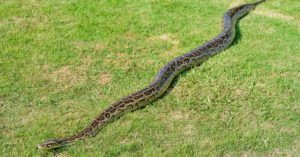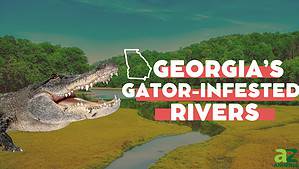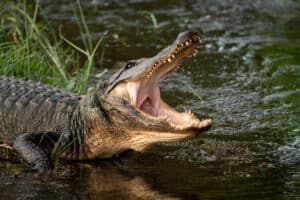While you may not think of alligators and Texas in the same sentence, did you know that Texas is home to several alligator-infested lakes? That’s right, there are at least four lakes in Texas that are hot spots for alligators – including Lake Lewisville, one of the largest lakes in all of Texas.
Ready to learn more about alligator-infested lakes right in Texas? Let’s dive in!
How many alligators are in Texas?
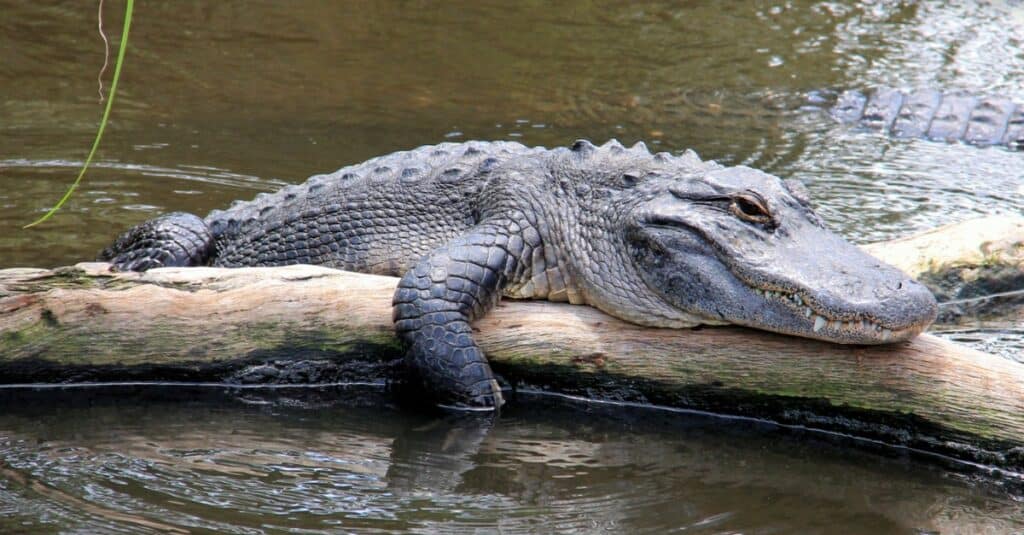
Because they are reptiles, alligators are most commonly spotted basking in the sun.
©iStock.com/Nikola Art
It’s not easy tracking how many alligators live in an area, especially an area as large as Texas. However, it is estimated that up to 500,000 alligators live in the Lone Star state. This makes Texas number three on the top ten states with the most alligators!
Typically, alligators are only found in the southeastern parts of the state. This is because this is the area that most closely lies in the alligator’s natural habitat.
Alligators in Lake Lewisville
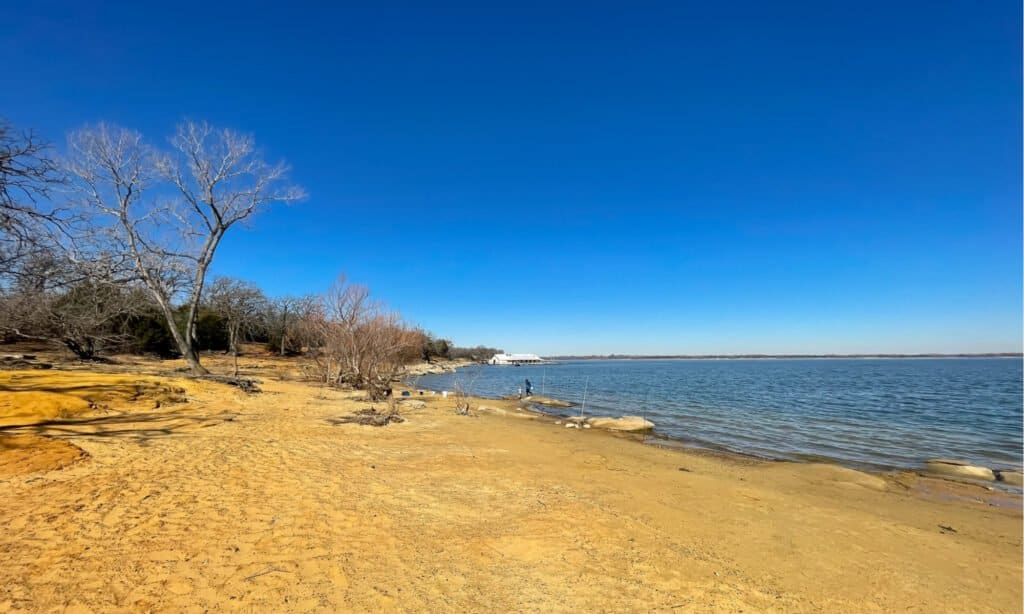
Lake Lewisville is home to alligators.
©Trong Nguyen/Shutterstock.com
Texas Parks and Wildlife reports there to be a few dozen alligators that call Lake Lewisville home. However, very few of these pose any type of threat to humans. The last relevant report of an alligator living in Lake Lewisville was in 2015. Here, a large 9-foot-long alligator was spotted in a drainage ditch. While it may have been startling, no injuries were reported.
Lake Lewisville is one of the top freshwater recreation areas in Texas. From swimming to boating and fishing to camping, there’s no end to the adventures at Lake Lewisville. However, some of these adventures may lead to an encounter with an alligator.
Like many lakes and rivers in the southern region of the United States, Lake Lewisville is connected to marshes and similar habitats that make the perfect home for alligators. As a result, spotting one basking in the sun on the shore, in the water, or occasionally crossing the road isn’t rare. However, it is rare for one to actively engage with a human – and even rarer for one to attack!
Are there Alligators anywhere else in Texas?
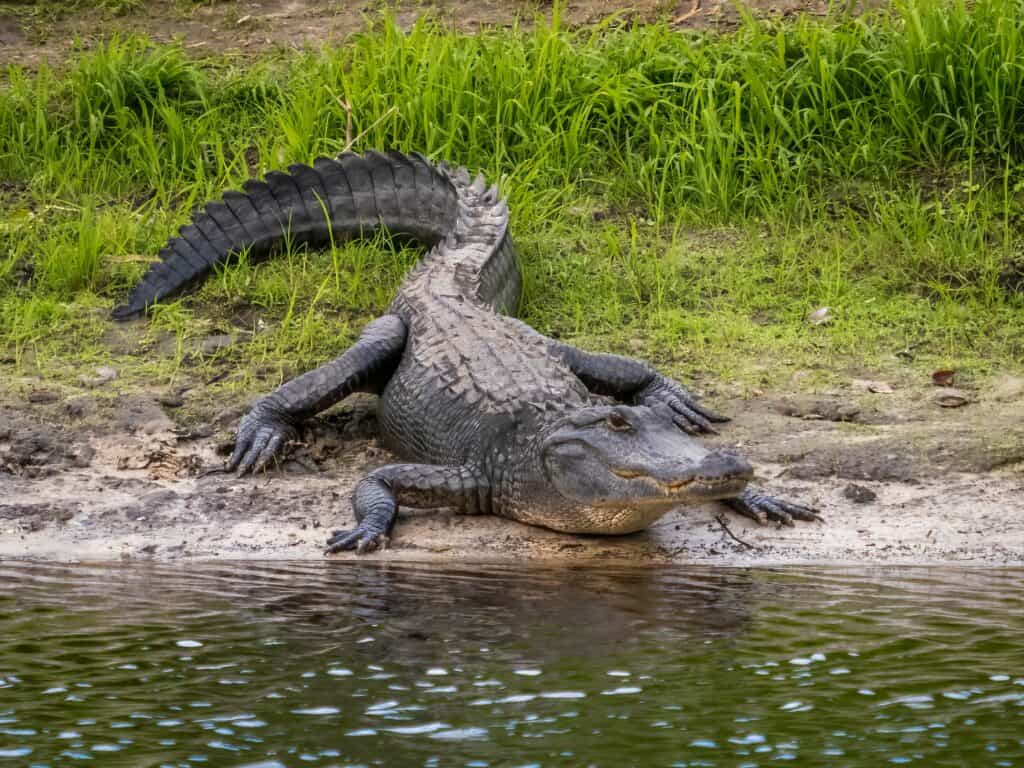
Alligators can sometimes be found in river deltas as well.
©Jim Schwabel/Shutterstock.com
Believe it or not, Texas is home to several alligator-infested lakes.
Although alligators are more common in humid tropical areas, such as throughout Florida, certain parts of Texas fall into the American alligator’s territory. As a result, you can find alligators in several locations in Texas. Outside Lake Lewisville, you can find alligators in Lake Worth, Caddo Lake, and Eagle Mountain Lake.
If you’re afraid of having a close encounter with an alligator at one of these lakes, you shouldn’t be. For most of the alligator-infested lakes in Texas, sightings are few and far between. However, since certain alligators can pose a threat to humans – those that are over four feet long – you should still be cautious when visiting any lake areas in Texas. Before visiting, just make sure to learn the proper precautions if you happen to stumble across an alligator.
What to do if you see an Alligator

Although many people fear the idea of sharing a river, lake, or stream with an alligator, alligator-related deaths are actually extremely rare. In Florida, for example, the alligator capital of the states, there were only around two dozen deaths recorded between 1948 and 2021. Alligators have a natural fear of humans, which is why it’s best to be aware when visiting one of Texas’ lakes rather than afraid.
You can find the complete guide to how to safely handle an alligator encounter through Texas Park and Wildlife. However, there are a few basic procedures.
Texas Alligator Safety
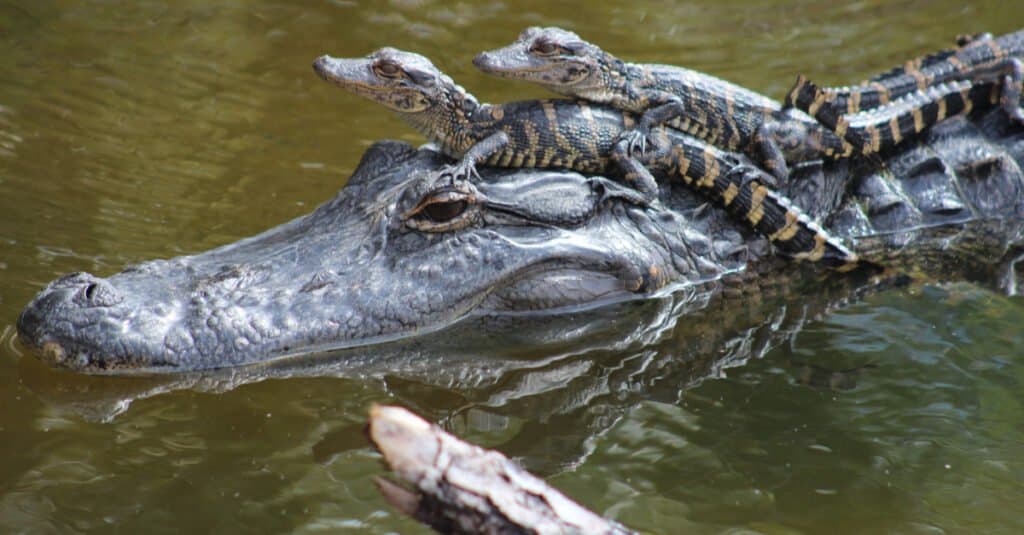
Alligators are most commonly seen during the breeding season.
©Marc Pletcher/Shutterstock.com
If you see an alligator resting in the water or on the bank, then leave it alone. If it’s not an obvious threat and under four feet, then you can typically allow it to continue its daily life. However, otherwise, you may need to contact TPWD for a safe relocation.
If you’re swimming or engaging in any other forms of recreation and stumble across an alligator, then back away slowly without turning your back on the gator. Typically, these large reptiles won’t put up a chase. If you hear it hiss, that’s a warning sign to let you know you’ve come too close.
The most dangerous type of alligator is the nuisance alligator. These are alligators that are over four feet long and have lost their fear of humans. They may lunge at you from the water or, if you’re fishing, follow your boat around. In these cases, you will need to contact TPWD immediately.
Lastly, if you know that an alligator has been spotted, be careful in those areas. If there’s been a recent sighting in an area you swim, avoid that spot for a few days to give the alligator time to move. If an alligator has been spotted in a residential area, make sure to keep a close eye on your pets.
Where is Lake Lewisville Located on a Map?
Lake Lewisville is in northeastern Texas, not too far from both Dallas and Forth Worth. It is in Denton County near an aptly named town of Lewisville, which is part of the Dallas-Forth Worth metroplex and a large suburban community of more than 100,000 residents. If you visit Lake Lewisville, it is ideal for fishing, skiing, boating, and swimming.
The photo featured at the top of this post is © iStock.com/cturtletrax
Thank you for reading! Have some feedback for us? Contact the AZ Animals editorial team.



